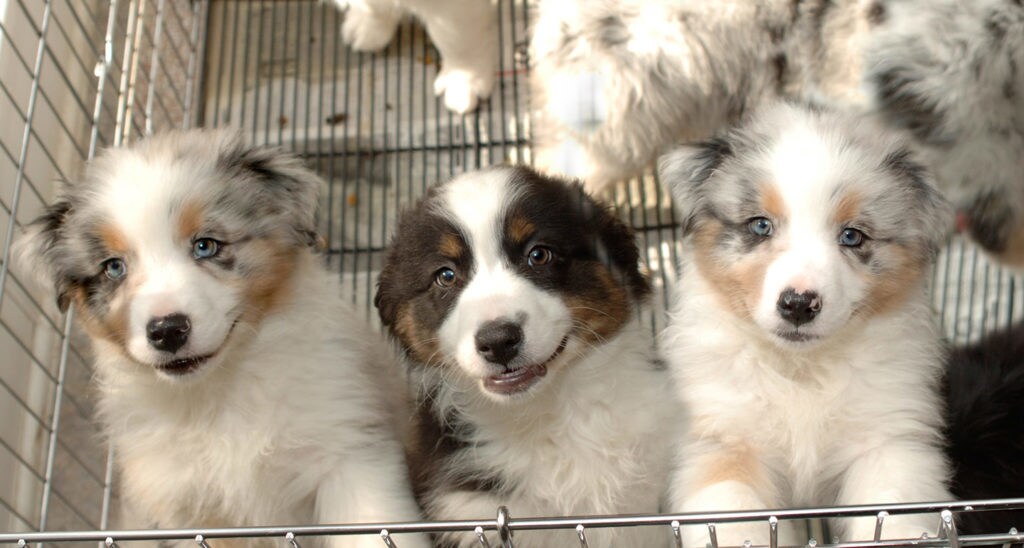You've probably already heard the arguments against buying a puppy from a pet shop. But regardless of how informed you are about animal welfare issues, once you’re in a pet shop, purchasing a dog may seem like no big deal. "Should I buy a puppy from a pet store?" you may wonder. There’s a very good reason for this—and it’s not the wellbeing of the animals puppy stores sell.
“You’re going to hear a very, very smooth pitch,” says John Goodwin, senior director of the Humane Society of the United States’ Stop Puppy Mills Campaign. “They’re not hiring animal care specialists—they’re hiring sales people, and what they’re telling you simply isn’t true.”
Don’t fall for these common lies told by puppy stores.
Disclaimer: Multiple sources from the pet store industry were contacted for this piece and declined to be interviewed.
“Our puppies are from responsible breeders.”
Many pet stores would have you believe that their puppies come from reputable, small-time breeders who treat their dogs like family, which can make you think you should buy a puppy from that pet store. This, unfortunately, is almost never true. According to Goodwin, almost every puppy in a pet store comes from a puppy mill.
“Let’s just think about the logistics of owning a [puppy store],” he says. “Are they going to go to one of the 200 small breeders who have a litter or two ever year, or are they going to go to a high-volume operation with a reliable supply?”
Puppies bred in puppy mills suffer inhumane, unsanitary conditions and do not receive adequate veterinary care, dog food, water, socialization or exercise. As discovered in a 2016 report by the Humane Society, breeding dogs at these facilities can spend their entire lives indoors stacked in tiny, filthy dog crates without fresh air or human interaction.
“All our puppies are USDA-licensed.”
This puppy store claim might actually be true—but it’s meant to mislead you, not ensure the welfare of the puppies.
“Many pet store owners and websites claim that their puppies are from ‘USDA licensed breeders’ to confuse and dupe consumers into buying their dogs,” says Gina Moraz, manager of the ASPCA’s Puppy Mills Campaign. “USDA licensure means very little—the regulations are mere ‘survival’ standards for the dogs and federal oversight and enforcement are very poor.”
In short, a USDA license doesn't mean you should buy that puppy from the pet store. In all likelihood, that puppy wasn’t raised on a farm—his puppy mill simply met the minimum standards, meaning his mother may still spend her entire life in a cage with a wire floor.
Similarly, purebred “papers” don’t ensure that a puppy came from a reputable breeder, only that both of its parents were also purebred. On the contrary, says Moraz, most breed clubs have a code of ethics that prevent members from selling puppies to pet stores.
“Our puppies are healthy.”
In early 2017, the Humane Society conducted an undercover investigation of a New York pet store and found puppies suffering from open wounds, pneumonia, fevers and seizures. While the report is shocking and difficult to read (it contains some graphic content, but can be viewed here), it’s not news to those involved in animal welfare work.
“We’ve routinely found that pet stores are overwhelmed by diseased puppies,” says Goodwin, who notes that employees attempt to mask symptoms with everything from off-label antibiotic use to Robitussin.
Many puppies are sick before they leave the mill, he says. And those who manage to stay healthy face a difficult trip to the pet store—puppies are crowded into trucks, sometimes for days, and are at risk for bacterial infections.
“Our puppies are happy.”
Puppies sold in pet stores suffer from more than physical ailments. Although they may appear excited when you walk by their cages, many are experiencing acute stress and will have lifelong behavioral issues.
“Puppies bred in inhumane conditions may suffer from behavior problems such as lack of socialization, stress, increased aggression and fear toward humans and other dogs, separation anxiety—issues that they don’t outgrow,” says Moraz, who notes that these problems often stem from early separation from their mother and being transported over long distances.
“Our puppies are well-cared for.”
The Humane Society’s undercover pet shop investigation found that overwhelmed, inexperienced employees shook, swatted and yelled at puppies.
“These are retail businesses—they’re trying to keep costs down and profits up,” says Goodwin. “They’re hiring people as cheap as possible—they’re not going to spend $65,000 on someone trained to take care of animals.”
However, even if a shop does provide adequate care for its puppies, that doesn't mean you should buy a puppy from that pet store. It’s likely still contributing to a cycle of cruelty.
“Because traditional pet stores rely on the mass production of puppies, they are supporting this cruel industry even if they provide decent care for the short time the puppy is there,” says Moraz.
Before you decide whether you should buy a puppy from a pet store, remember the facts above. To do your part in ending puppy mills, adopt your next pet from a shelter or breed-specific rescue. If you choose to purchase a dog, the Humane Society provides guidelines on how to find a responsible breeder.
Share:









